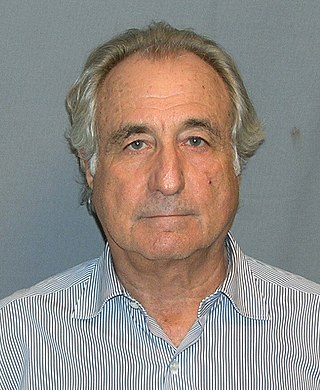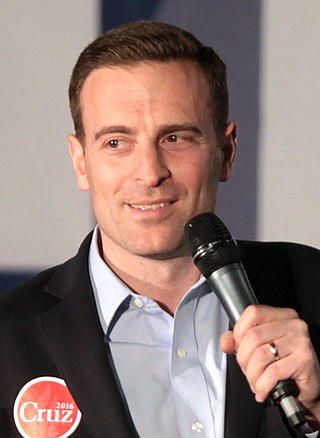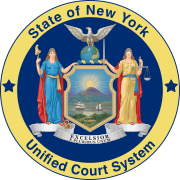Theodore V. Wells, Jr. is an American lawyer who works in the field of criminal law. He is a litigation partner at the New York law firm of Paul, Weiss, Rifkind, Wharton & Garrison and a fellow of the Harvard Corporation.
Milberg Coleman Bryson Phillips Grossman, PLLC is a US plaintiffs' law firm, established in 1965 and based in New York City. It has mounted many class action cases on behalf of investors, and has been recognized as among the leading firms in its field by the National Law Journal, RiskMetrics Group, Securities Class Action Services, and Law360.

Gary Gensler is an American government official and former Goldman Sachs investment banker serving as the chair of the U.S. Securities and Exchange Commission (SEC). Gensler previously led the Biden–Harris transition's Federal Reserve, Banking, and Securities Regulators agency review team. Prior to his appointment, he was professor of Practice of Global Economics and Management at the MIT Sloan School of Management.
Human rights violations in Aceh, Indonesia occurred in the late 1990s and early 2000s when ExxonMobil hired Indonesian military units to guard their Arun gas field, and these military units raided and razed local villages. Government inquiries have extensively documented these abuses. Victims allege that ExxonMobil knew about the atrocities, which include assault, torture, and murder, and should be liable for them. The company denies these accusations; its primary defense is that the human rights violations which were occurring were not a result of specific intention of the organization and therefore it cannot be held liable.
TheMartin Act is a New York anti-fraud law, widely considered to be the most severe blue sky law in the country. Passed in 1921, it grants the Attorney General of New York expansive law enforcement powers to conduct investigations of securities fraud and bring civil or criminal actions against alleged violators of the Act. It was used infrequently until the early 2000s, when then-Attorney General Eliot Spitzer began using it to bring civil cases against Wall Street firms. It has since become the basis for a number of high-profile cases, including a 2002 investigation of Merrill Lynch for alleged conflicts of interest, and the 2012 suit against Bank of New York Mellon Corp. for allegedly defrauding customers through foreign currency transactions.

Kivalina v. ExxonMobil Corp., No. 4:08-cv-01138, is a lawsuit filed on February 26, 2008, in a United States district court. The suit, based on the common law theory of nuisance, claims monetary damages from the energy industry for the destruction of Kivalina, Alaska by flooding caused by climate change. The damage estimates made by the U.S. Army Corps of Engineers and the Government Accountability Office are placed between $95 million and $400 million. This lawsuit is an example of greenhouse gas emission liability.

ExxonMobil Corporation is an American multinational oil and gas corporation and the largest direct descendant of John D. Rockefeller's Standard Oil. The company, which took its present name in 1999 per the merger of Exxon and Mobil, is vertically integrated across the entire oil and gas industry, and within it is also a chemicals division which produces plastic, synthetic rubber, and other chemical products. ExxonMobil is headquartered near the Houston suburb of Spring, Texas, though officially incorporated in the U.S. state of New Jersey.

Participants in the Madoff investment scandal included employees of Bernard Madoff's investment firm with specific knowledge of the Ponzi scheme, a three-person accounting firm that assembled his reports, and a network of feeder funds that invested their clients' money with Madoff while collecting significant fees. Madoff avoided most direct financial scrutiny by accepting investments only through these feeder funds, while obtaining false auditing statements for his firm. The liquidation trustee of Madoff's firm has implicated managers of the feeder funds for ignoring signs of Madoff's deception.

Warren Kenneth Paxton Jr. is an American politician and lawyer who is serving as the attorney general of Texas since 2015. A member of the Republican Party, he previously served in the Texas Senate representing the eighth district and a member of the Texas House of Representatives.

Edgardo Ramos is a United States district judge of the United States District Court for the Southern District of New York.
The Jacksonville, Maryland, ExxonMobil gas leak case is a series of lawsuits against ExxonMobil as a result of a February 2006 underground gasoline leak from an ExxonMobil service station in Jacksonville, Maryland.
John Doe VII v. Exxon Mobil Corp (09–7125) is a lawsuit filed in the United States by 11 Indonesian villagers against ExxonMobil Corporation alleging that the company is responsible for human rights violations in the oil-rich province of Aceh, Indonesia. The case has broad implications for multinational corporations doing business in other countries. Indonesian security forces committed torture, rape, and murder against the plaintiffs and their families while under contract with ExxonMobil to guard the Arun gas field during the late 1990s and early 2000s; plaintiffs claim that Exxon is responsible for these atrocities.

Adam Paul Laxalt is an American attorney and politician who served as the 33rd Nevada Attorney General from 2015 to 2019. A member of the Republican Party, he was the party's unsuccessful nominee for governor of Nevada in 2018 and for the U.S. Senate in 2022.

As the world's largest majority investor-owned oil and gas corporation, ExxonMobil has received significant amounts of controversy and criticism, mostly due to its activities which increase the speed of climate change and its denial of global warming.

Since the 1970s, American fossil fuel and energy corporation ExxonMobil has engaged in climate research focusing on global warming. It later began lobbying, advertising, and grant making, some of which were conducted with the purpose of delaying widespread acceptance and action on global warming.

Climate change in Connecticut encompasses the effects of climate change, attributed to man-made increases in atmospheric carbon dioxide, in the U.S. state of Connecticut.

Climate change litigation, also known as climate litigation, is an emerging body of environmental law using legal practice to set case law precedent to further climate change mitigation efforts from public institutions, such as governments and companies. In the face of slow politics of climate change delaying climate change mitigation, activists and lawyers have increased efforts to use national and international judiciary systems to advance the effort. Climate litigation typically engages in one of five types of legal claims: Constitutional law, administrative law, private law (challenging corporations or other organizations for negligence, nuisance, etc., fraud or consumer protection, or human rights.
Connecticut v. ExxonMobil Corp is a climate change litigation case brought on ExxonMobil for seeking profit despite knowing the damages it would produce on the environment.
Cohen Milstein is an American plaintiffs' law firm that engages in large-scale class action litigation. The firm filed a number of lawsuits against Donald Trump during and after his presidency, including a lawsuit which successfully blocked the Trump administration's attempt to roll back the Deferred Action for Childhood Arrivals (DACA) program. Cohen Milstein has made the implementation of corporate diversity, equity, and inclusion (DEI) programs a key part of its litigation strategy. The firm has been hired by various state attorneys general to assist in complex litigation, including by suing ExxonMobil over climate change. Anita Hill was formerly of counsel at Cohen Milstein.

District of Columbia v. Exxon Mobil Corp. is an ongoing lawsuit filed against Exxon Mobil Corporation and ExxonMobil Oil Corporation by the District of Columbia (D.C.). This case is one of a long list of lawsuits filed against ExxonMobil including environmental and ethical wrongdoings.












